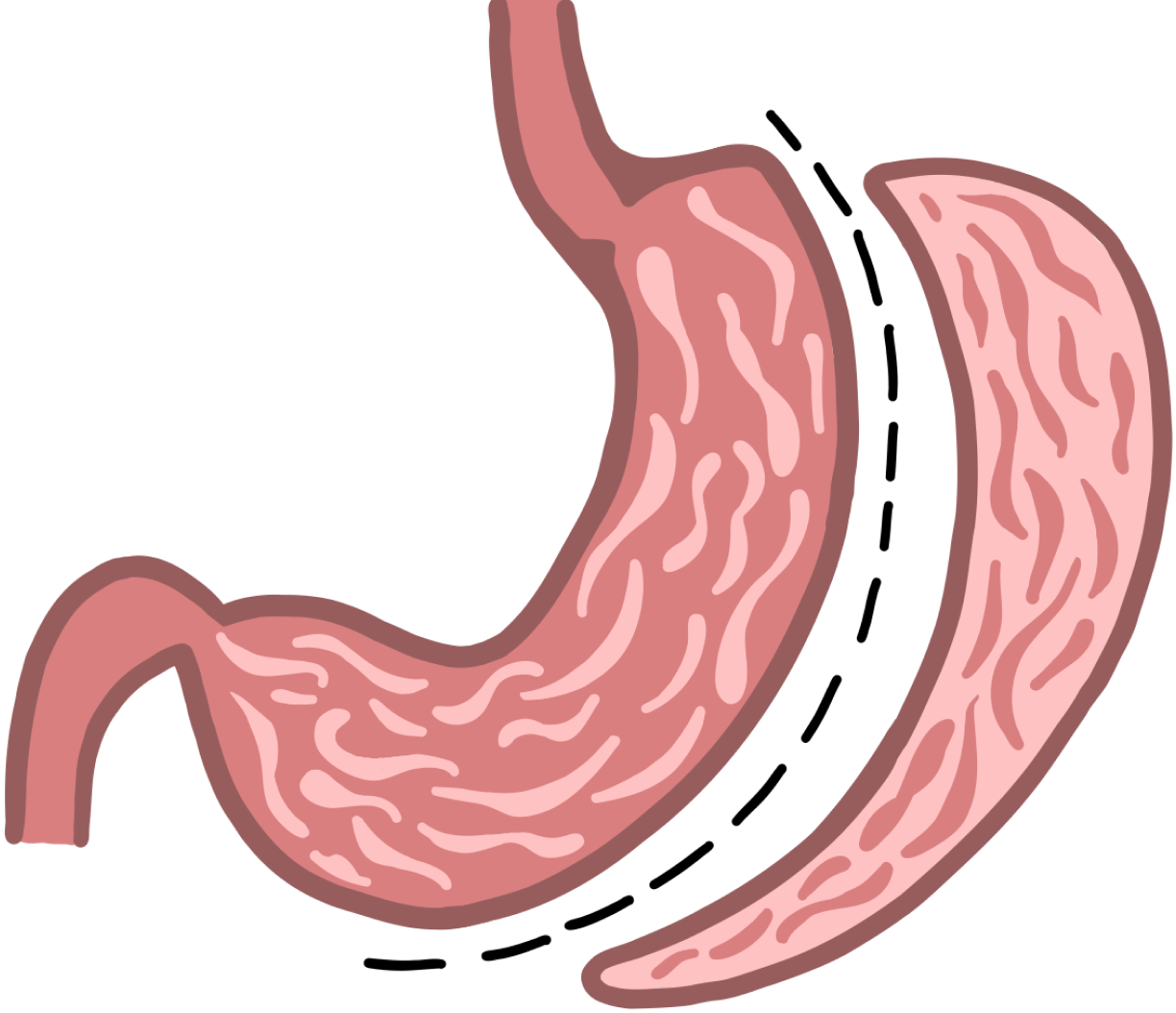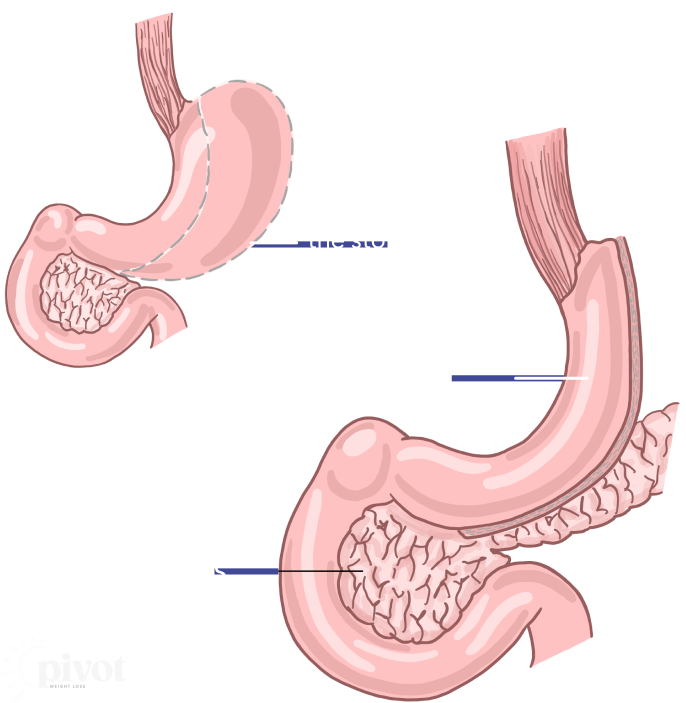Home » Procedures » Vertical Sleeve Gastrectomy

Contact
40 - 60 minutes
General, typically done laparoscopically
1 - 2 weeks from work
6 - 8 weeks before physical exercise
Sleeve gastrectomy, also known as vertical sleeve gastrectomy, is a surgical procedure used for weight loss. During this procedure 80-90% of the stomach is surgically removed, leaving a stomach about the size of a banana.
Rapid weight loss
Physical changes, such as improved mobility, increased energy levels, and relief from joint pain
Nutrient absorption is not affected
Potential reduction in obesity-related health issues, including diabetes, high blood pressure, high cholesterol, and sleep apnea.
Emotional and Psychological Impact: Weight loss can boost self-esteem and body image, but it can also bring about new challenges and adjustments.

What is
The Sleeve Gastrectomy?
What is The Sleeve Gastrectomy?

During the sleeve gastrectomy, surgeons remove 75-85% of the stomach, creating a smaller gastric pouch. This reduction in stomach size limits the amount of food that can be consumed, leading to decreased calorie intake and subsequent weight loss. The “sleeve” remains connected to the intestines, so food is digested normally.
Candidates for sleeve gastrectomy are typically individuals who meet specific criteria for bariatric surgery and have struggled with obesity or related health conditions.
Candidates often have a BMI of 40 or higher, indicating severe obesity. In some cases, individuals with a BMI of 35-39.9 may also be considered if they have significant obesity-related health issues.
Candidates have made previous attempts to lose weight through non-surgical means, such as diet and exercise, but have been unsuccessful in achieving sustainable weight loss.
Candidates may have obesity-related health issues, such as type 2 diabetes, high blood pressure, sleep apnea, or joint problems, which can improve with weight loss.
Candidates must demonstrate a strong commitment to making significant lifestyle changes after the surgery, including nutrition and behavior modifications, and regular physical activity.
Candidates should be in reasonably good health to undergo surgery and tolerate the recovery process.
It's important to note that the final determination of candidacy for sleeve gastrectomy is made by a bariatric surgeon who evaluates the individual's specific medical history, physical examination, and other relevant factors.
Removing part of the stomach aids in weight loss in two ways: the new pouch holds less food, and by removing much of the stomach, surgeons also remove the area that creates Ghrelin, a hormone responsible for triggering hunger. Sleeve patients experience less hunger and feel full more quickly.
Along with behavior changes like food choices and incorporating exercise, most sleeve patients lose 30 to 50 percent of their excess body weight within a year of the sleeve procedure.
Recovery after surgery is a process and the timeline can vary from person to person. Here's an overview of what to expect during the recovery period:
Some level of pain, discomfort, and abdominal soreness is common after the surgery. Your healthcare team will prescribe pain medication to help manage any discomfort during the early stages of recovery.
After the surgery, you will typically remain in the hospital for a few days to be monitored closely. The medical team will ensure that you are healing well, manage pain, and provide instructions for the initial stages of recovery.
Immediately after surgery you will start a clear liquid diet, gradually progressing to a full liquid diet. This allows the new pouch to heal and helps the stomach adjust to the reduced size.
Over the following weeks, you will gradually transition to a pureed and soft food diet as per your surgeon's instructions. It is important to follow the guidelines provided by your registered dietitian to ensure proper healing and maximize the effectiveness of the procedure.
After the procedure, permanent adjustments to eating habits are required. The smaller stomach size restricts the amount of food that can be consumed at one time, leading to smaller portion sizes and the need to eat more frequently. A dietitian will provide guidance on proper nutrition and meal planning.
Adopting a healthy and active lifestyle is crucial for long-term success. Regular physical activity is recommended to support weight loss, maintain muscle mass, and improve overall well-being.
It's important to start walking as soon as possible after surgery. Other forms of activity like resistance training should be avoided until cleared by the surgeon. Gradually increasing physical activity and incorporating regular exercise into your routine is important for overall health.
Bariatric surgery requires a lifetime of aftercare. Regular follow-up appointments will be scheduled with your surgical team to monitor your progress and provide ongoing support and guidance. These appointments are essential for long-term success and to ensure optimal recovery.
NO - the VSG is permanent and cannot be reversed.
YES - because the smaller stomach will restrict food intake, bariatric vitamins will be required. Your registered dietitian will work with you to find vitamins that meet your nutritional needs after surgery.
Studies show the VSG can help patients achieve 50-70% excess weight loss within 2 years after surgery. Most patients experience improvement or resolution of obesity-related health conditions like type 2 diabetes, high blood pressure, sleep apnea, and join pain.
You are able to start walking immediately after surgery and most patients go back to work within 1-2 weeks. You will be asked to avoid swimming and resistance or weight training for a few weeks after surgery.
The VSG is a permanent procedure, however return of old habits can result in weight regain. It is important to continue post-operative follow up schedules with your surgeon and dietitian to maintain continued success.
While weight regain is challenging after surgery, non-adherence to recommended lifestyle changes could lead to limited results.
On average, people can expect to lose at least 50% of their excess body weight within the first year after surgery. For someone with 100 pounds to lose, they could expect to lose 50 pounds within a year.
Pre-operative testing varies for each patient. Testing may include: lab work, Upper GI study or endoscopy, colonoscopy, well-woman exam, chest x-ray, EKG